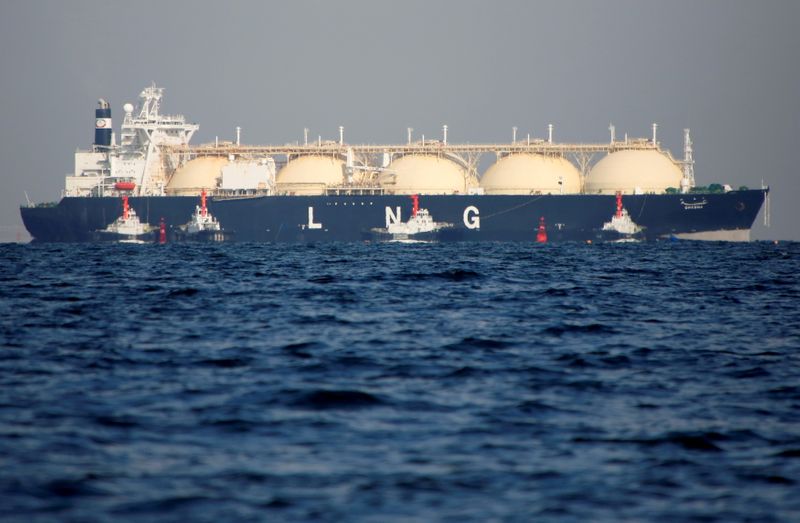By Liz Hampton and Scott DiSavino
(Reuters) - U.S. natural gas producers hope climate-conscious electric utilities and gas exporters will pay a premium for what they say is "greener gas" that has been certified as coming from low-emission operations or from renewable sources such as landfills.
EQT Corp (NYSE:EQT), Chesapeake Energy (NYSE:CHK) and liquefied natural gas firms Cheniere Energy (NYSE:LNG) and NextDecade (NASDAQ:NEXT) Corp are among the companies considering low-carbon certifications from groups such as Denver-based Project Canary. Gas certified as "responsibly produced" and contributing less emissions could get up to 5% above market prices, or up to 15-cents per thousand cubic feet (mcf), proponents say.
So far, not many customers have been willing to pay the premium -- a problem for firms trying to sell lower-carbon versions of fossil fuels. Some European buyers have shunned U.S. shale gas and several U.S. cities including New York and San Francisco have sought to ban new residential gas connections over environmental concerns.
In 2020, the pandemic rocked the economy and U.S. gas prices fell to a 25-year low average of $2.11 per mcf. Idle drillers pushed U.S. gas output down 2%, the first annual drop in four years. While power plants consumed a record amount of gas in 2020, wind and solar have been gaining market share as preferred alternatives to dirtier coal for electric generation.
With the economy recovering, U.S. benchmark gas prices are up over 40% this year to about $3.70 per mcf.
“When you’re talking about trillions of cubic feet of global gas production, mere pennies in price movement can make all the difference between profitability and losses," said Kentaro Kawamori, chief executive of Persefoni, which develops tools to measure a company's carbon footprint.
Utilities, the biggest gas buyers, have endorsed net-zero emissions targets, "but it is not being translated into procurement departments," said Chris Kalnin, chief executive of U.S. shale gas producer BKV Corp.
WILL THERE BE A CLEAN PREMIUM?
BKV aims to certify its fuel as "responsibly" produced and hopes for a commitment from electricity generators, he said. Continuous monitoring for certification can cost 1 to 2 cents per mcf, which is a hurdle along with competing measurements. Executives also noted that utility regulators who approve rate increases for gas purchases have yet to consider carbon emissions in price reviews.
Cheniere, the top U.S. liquefied natural gas (LNG) exporter, believes cleaner gas may become a requirement for producers and exporters.
"We don't expect to pay a premium, we don't expect to collect a premium" for gas certified as greener, said Anatol Feygin, chief commercial officer at Cheniere. The company is the biggest buyer of gas in the United States for its LNG plants, accounting for about 7% of U.S. production.
One problem is the lack of standard measures. Cheniere has launched an effort with five shale firms to evaluate and measure emissions, said Feygin. Project Canary, Rocky Mountain Institute (RMI) and their Environmental Defense Fund also are pursuing their own techniques to rate environmental footprints.
Cheniere said it has been in discussions with gas suppliers for about three years on emissions but "it's early days and we have not settled on the methodology" for rating producers.
'POLITICALLY COMPLICATED'
Pension funds and other big institutional stock market investors also want energy firms to reduce their carbon footprints. Producers who account for 10% to 11% of U.S. gas production have embraced ratings, mostly with Project Canary. The Denver firm has dozens of big companies planning to use its measurements, a spokesperson said.
To arrive at its green rating, Project Canary monitors 600 items including methane emissions, use of fracking fluids and waste water disposal.
It also could take time to get buyers and sellers to agree on contract terms. Utilities would need regulators to approve higher rates for responsibly sourced gas. That, said Project Canary CEO Chris Romer, requires "a politically complicated process."
Romer hopes LNG buyers will require producers to have their production and transportation processes vetted. About 7% of U.S. gas production last year was exported as LNG to Asia, South America and Europe.
"Foreign purchasers of LNG are raising the bar," he said. LNG developer NextDecade signed up with Project Canary after it lost a deal with French utility Engie SA over environmental concerns.
RENEWABLE NATURAL GAS
So far, no utilities have built low-emissions sources into routine gas purchases although some, including Sempra Energy (NYSE:SRE)'s Southern California Gas (SoCalGas) unit, Xcel Energy Inc (NASDAQ:XEL) and New Jersey Natural Gas, have purchased cleaner gas for small portions of their operations.
SoCalGas wants to source 5% of the gas it sells from renewable natural gas by 2022 and 20% by 2030, said Jawaad Malik, chief environmental officer at SoCalGas. Legislation that would allow the utility to buy the fuel has not yet passed, he said.
Gas produced from animal farms and landfills, called renewable natural gas, is selling at a premium to market rates, but supplies of the niche fuel are vastly more limited than conventional gas and very costly.
RNG can fetch between $15 to $100 per mcf depending on contract volumes because it is largely methane, a powerful greenhouse warming gas. Even using RNG for a fifth of gas supplies can offset a company's total carbon emissions, said Aaron Ruby, a spokesman for Dominion Energy Inc.
"It does not take a lot of RNG to get a whole lot of climate bang for your buck," Ruby said. Dominion plans to collect RNG from livestock farms that would capture 3.5 million metric tonnes of carbon dioxide (CO2) equivalent emissions per year.
